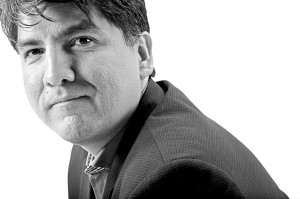Author Sherman Alexie, On Writing For Young Adults
When we sat in on classes at Miami Northwestern High School to report on the Million Word Campaign, one of the writers whose work was discussed was Sherman Alexie.
Alexie frequently writes about American Indian life, including the movie Smoke Signals.
Alexie also appeared at the Miami Book Fair International last year to talk about writing young adult fiction. This year’s Miami Book Fair International opens this weekend, so we thought we’d re-post the interview Alexie did with StateImpact Florida last year.
Q: How is writing fiction for young adults different than the kinds of stories you wrote before Flight and before The Absolutely True Diary of a Part-Time Indian?
A: I didn’t write Flight for teens. It just worked out that way. I still don’t think it’s for teens necessarily. It’s a book that contains a 12-yr-old girl genitally mutilating a Cavalry soldier. I don’t remember that in the last Harry Potter novel.
I think the fact that Flight does get taught is great. But I never meant it to be that.
In writing True Diary, I didn’t necessarily think of it that way either.
Teens, young readers, are going to sniff condescension right away. So I always go by the definition my editor has for young adult literature: young adult literature is whatever a young adult happens to be reading at that moment.
Q: Talking about The Absolutely True Diary of a Part-Time Indian—it deals with some real, often rough subject matter. Alcoholism, domestic violence, poverty, teenage boy sexual frustration. They’re subjects that you’ve tackled in other works. What does having a teenage protagonist allow you to do in that kind of story that you haven’t done before?
A: I don’t think I talked about masturbation in my work as much as I did in True Diary. He mentions it three times. He mentions it three times; he doesn’t do it. And that’s enough to get it banned in some schools.
I think those sort of teenage obsessions are something I get to write about because I’m writing about a teen, but it’s also fun.
Q: It’s a New York Times bestseller, it won a National Book Award, and like you mentioned, it’s also been banned in a few places. What does that tell you?
A: That I wrote a great book. I wrote the book that needs to be read.
Percival Everett, the writer, always says that if you’re getting banned then you’re offending the right monsters.
Q: Which monsters are those?
A: Repressive, conservative religious freaks who want to control everybody’s reading material, not just their children’s.
Q: What are the stories that you read as a kid that have stuck with you?
A: Oh my gosh. Stephen King, who was always writing about underdogs, and bullied kids, and kids fighting back against overwhelming, often supernatural forces. The world aligned against them.
As an Indian boy growing up on a reservation, I always identified with his protagonists. Stephen King, fighting the monsters.
Q: You have children of your own, right?
A: Yup. Two boys, 16 and 12.
Q: What are the books that you’ve handed them?
A: Those days are long over. They are free agents in the reading world. Their recommendations now come from their peers.
I know my younger son has really been getting into John Green, which is great. John Green is awesome.
And my older son is very much a World War II and John F. Kennedy assassination buff right now. He goes on the Internet to look for what he should be reading and then he asks me if I have that book. I end up being a resource, a lending library rather than the librarian.
